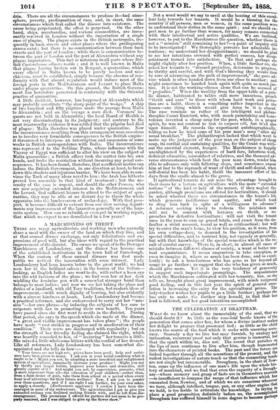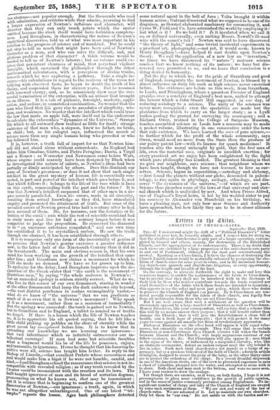THE CELEBRATION AT GRANTHAM.
WHAT do we know about the immortality of the soul, that we should doubt it ? As little as the rose-leaf beetle knows of the generation that comes after her, for whom a divine instinct makes her delight to prepare that procreant bed ; as little as the child knows the source of the food which it seeks with unerring emu-, racy. Scarcely a day we live but may furnish, by analogy and intimation, recurrent proof not only that genius is immortal, but that the spark within us, dies not. The sound that perishes on the lips of man continues to live after him, though transmuted into the characters of printed books. The past and the future are linked together through all the sensations of the present, and the rudest investigations of nature teach us that the connecting bonds are not single but innumerable. Brougham, in the chair of New. - ton, sums up the influence of one man's life upon the whole his- tory of mankind, and we find that even the capacity of a Brough- am—whose memory and grasp of facts are in themselves i.narrels —is insufficient to compass the range of that influence which has emanated from Newton, and of which we are conscious wherever we turn, although intellect, tongue, pen, or any other engine that we hold, is too feeble to articulate the knowledge. In trying tO place a good proposition definitely before us, the accomplished Brougham has suffered himself in some degree to become perhaps too abstruse--not popular enough. But the thousands who read with admiration, and criticize while they admire, yearning to find a larger expression of Newton's influence and character, will discover that they can only touch points which the orator omitted because the clock itself would have forbidden complete- ness. Lord Brougham, in characterizing the nature of Newton's analytical discoveries, told us of what was most important in his relation to the progress of science and of mankind. But he could not stop to tell us much that might have been said of Newton's character as a man, and who can solve the difficult, sad, and glorious problem of that character? A thick volume would be needed to tell us of Newton's labours ; but no volume could ex- press that persistent clearness of mind, that perpetual vigilant foresight, which sustained the philosopher through the driest mathematical calculations, with a perception of divine truths, towards which he was exploring a pathway. Take a single in- stance—his calculations in regard to the motions of the moon not tallying with observed facts, he began to doubt the truth of his theory, and suspended them for sixteen years. But he resumed with renewed energy, and, as he consciously drew near the suc- cessful termination of the enterprise, with an ardour that brought on an illness. It is a tale of patience, foresight, modesty, appli- cation, and ardour, in unmatched combination. No wonder that the man who lived that life gave rise to anecdotes of simplicity, wis- dom, and weakness. No wonder that the intellect which could trace the law that made an apple fall, wore itself out in the endeavour to calculate the exhaustless "dynamics of the Universe." Strange life which to all outward show realized so little for itself; strange existence of that man who, a stepson, knew no father, no bride, no child ; but, as his eulogist says, influenced the march of science more than any single human being who preceded or who has followed him.
It is, however, a truth full of import for us that Newton him- self did not stand alone without antecedents. As Raphael had before him Cimabue, Giotto, and Pietro Perugino ; Dante, a Virgil and a Homer ; as Worcester and Newcomen came before Watt, whose engine could scarcely have been designed by Black when he investigated the nature of caloric, so Newton's ideas had been partially or dimly anticipated by others. Does this diminish our sense of Newton's greatness ; or does it not show that each single intellect in the great mystery of human life is essentially con- nected, is part and parcel of the intellect which goes before it, and that which follows it; belongs to the life of the race while it lasts on this earth, commanding both the past and the future ? It is true that Newton's intellect surpassed that of other men in a de- gree scarcely paralleled. Even his errors, made in all sincerity, resulting from actual knowledge as they did, have stimulated enquiry and promoted the attainment of truth. But some of the so-called errors of Newton proved true half a century after he had been accused of them. He, for instance, saw the nutation or ii- bastion of the earth's axis while the rest of scientific mankind had to study more and live for half a century longer before it was competent to judge the proposition. He conceived the diamond to be " an unctuous substance coagulated," and our own time has established it to be crystallized carbon. He saw the truth through one channel, it has been established through others.
It is to recognise only one form of the immortality of genius if we perceive that Newton's genius exercises a greater influence now, in the latter half of the Nineteenth Century than it did in the Seventeenth. The main and obvious reason is, that his own mind has been working on the growth of the intellect that came after him; and Grantham now claims a monument for which in Pi21 she made DO demand. We have so far grown up to him. To apologize for the delay, Lord Brougham improves upon the de- claration of the Greek orator that "the earth is the monument of illustrious men," by saying "the whole universe is Newton's ; " but an unneeded apology is seldom strictly correct. What do we, who live in this corner of our own firmament, staring in wonder at the other firmaments that lamp the dark unknown city beyond, --the vast district perchance in realms unimaginably vaster,— what do we know of "the universe" that we can predicate so much of it as even that it is Newton's monument ? Why speak of it as a monument, rather than as a mansion of immortality ? But the apology was unneeded : the tomb is gained not to Newton, but to Grantham and to England, a tablet to remind us of truths we forget. If there is a lesson which the life of Newton teaches as, it is to appreciate his oft quoted saying, that he felt like a little child picking up pebbles on the shore of eternity while the great ocean lay unexplored before him. It is to know that in extending our knowledge we are learning our ignorance— that vast inheritance which so infinitely outmeasures our in- tellectual earnings! If man had none but scientific faculties What a fragment would his be of the life he possesses, _enjoys, and, transmits, in ignorance. If ever he thought that his knowing fa- eulties were all, science has taught him better. In reply to the Bishop of Lincoln,—that excellent Prelate whose earnestness and ,ae..al would make him a bigot if he were not humble, candid, and flt1,—LordBrougham echoed the reassurance that science is not in- Compatible with revealed religion; - as if any truth revealed by the ereator could be inconsistent with the creation and its laws. The half-taught ignorance of man and its brood of sectarian dogmas, pronouncing on what he knows not, that may be inconsistent ; l?nt it is science that is beginning to confirm one of the greatest
discoveries of Newton,— i Newton,—our ignorance; a truth, again, n which
he was not altogether unharbmgered. One of our latest 'tn- pbs
repeats the lesson. Ages back philosophers detected
some natural agent in the bolt of Jove ; Volta brought it within human action ; Galvani discovered what we supposed to be one of its disguises, as Oersted elaborated machinery for commuting it, and Cyrus W. Field and Co. have astonished the world by employing it : but what is it ? Do we hold it ? Is it insulated when we call it so, or diffused universally, even uniting Messrs. Newall's ill-used wire with the comet's tail ? Newton was said to have discovered "the theory of light," and some trivial incidental experiments in a practical art, photography,—not yet, it would seem, known to Henry Brougham !—have helped to cast doubts upon Newton's theory. We call the application of a new law an "invention," we fancy we have discovered its " nature "; maturer science teaches that we know nothing of its nature ; we have but dis- covered uses permitted to us, and we learn that conclusion is a thing denied to humanity. But the clay in which we, for the pride of Grantham and good of England, inaugurate the monument of Newton, is blessed by a direct influence on daily life such as high science never exercised before. The evidences are before us this week, from Grantham, to Leeds, and Birmingham, where a quondam Premier of England presides over a conclave of England's best men, united to attempt the labour which a John Stuart Mill suggested, in our clay, of reducing sociology to a science. The unity of the sciences was never more recognized ; even the specialties are made but the platforms from which to carry on the larger study ; as a Lyell makes geology the ground for surveying the cosmogony ; and a Richard Owen, trained in the College of Surgeons Museum, teaches assembled science at Leeds how a museum may be made a pocket volume, illustrating in one consecutive order the laws that rule existence. We have learned the uses of pure science,— to further which for the profit of the whole ca'mmunity, says Owen, would need no more from the State than the produce of our paltry patent law—with its licence for quack medicines ! It teaches also the moral unbought by gold, that the best uses of life, even the material uses, originate in unselfish exertion ; for every practical art we enjoy has been enlightened by the light which pure philosophy has kindled. The greatest blessing is that we give our neighbour, says science ; that neighbour whom we have been taught, though we have not learned, to love as our- selves. Science, begun in superstition,—astrology and alchemy, —first found the planets without our globe, descended in paleon- tology, to rise again in phytology, zoiilogy, ethnology, and dis- cover " the dynamics of the universe,"—of which we are part. Science thus preaches some of the laws of that universal and eter- nal church which is undivided by sect. And when Prince Alfred, one of England's Royal heirs, is led by his wedded sister to pay his courtesy to Alexander von Humboldt on his birthday, we have a pleasing sign, not only how near Science and Authority have approached, but how likely they are to be in closer alliance for the future.



























 Previous page
Previous page